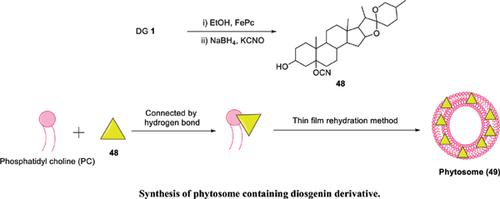Mini-Reviews in Medicinal Chemistry ( IF 3.8 ) Pub Date : 2021-07-31 , DOI: 10.2174/1389557521666210105111224 Nivedita Bhardwaj 1 , Nancy Tripathi 1 , Bharat Goel 1 , Shreyans K. Jain 1

|
During cancer progression, the unrestricted proliferation of cells is supported by the impaired cell death response provoked by certain oncogenes. Both autophagy and apoptosis are the signaling pathways of cell death, which are targeted for cancer treatment. Defects in apoptosis result in reduced cell death and ultimately tumor progression. The tumor cells lacking apoptosis phenomena are killed by ROS- mediated autophagy. The autophagic programmed cell death requires apoptosis protein for inhibiting tumor growth; thus, the interconnection between these two pathways determines the fate of a cell. The cross-regulation of autophagy and apoptosis is an important aspect to modulate autophagy, apoptosis and to sensibilise apoptosis-resistant tumor cells under metabolic stress and might be a rational approach for drug designing strategy for the treatment of cancer. Numerous proteins involved in autophagy have been investigated as the druggable target for anticancer therapy. Several compounds of natural origin have been reported, to control autophagy activity through the PI3K/Akt/mTOR key pathway. Diosgenin, a steroidal sapogenin has emerged as a potential candidate for cancer treatment. It induces ROS-mediated autophagy, inhibits PI3K/Akt/mTOR pathway, and produces cytotoxicity selectively in cancer cells. This review aims to focus on optimal strategies using diosgenin to induce apoptosis by modulating the pathways involved in autophagy regulation and its potential implication in the treatment of various cancer. The discussion has been extended to the medicinal chemistry of semi-synthetic derivatives of diosgenin exhibiting anticancer activity.
中文翻译:

薯蓣皂苷元及其半合成衍生物的抗癌活性:在自噬介导的细胞死亡和诱导细胞凋亡中的作用
在癌症进展过程中,由某些致癌基因引起的受损细胞死亡反应支持细胞不受限制的增殖。自噬和凋亡都是细胞死亡的信号通路,是癌症治疗的靶点。细胞凋亡缺陷导致细胞死亡减少并最终导致肿瘤进展。缺乏凋亡现象的肿瘤细胞被 ROS 介导的自噬杀死。自噬性程序性细胞死亡需要凋亡蛋白来抑制肿瘤生长;因此,这两种途径之间的相互联系决定了细胞的命运。自噬和细胞凋亡的交叉调控是调节自噬的重要方面,细胞凋亡并在代谢应激下使抗凋亡的肿瘤细胞敏感,可能是治疗癌症的药物设计策略的合理方法。许多参与自噬的蛋白质已被研究作为抗癌治疗的药物靶点。已经报道了几种天然来源的化合物,通过 PI3K/Akt/mTOR 关键途径控制自噬活性。薯蓣皂苷元是一种甾体皂苷元,已成为癌症治疗的潜在候选药物。它诱导 ROS 介导的自噬,抑制 PI3K/Akt/mTOR 通路,并在癌细胞中选择性地产生细胞毒性。本综述旨在关注使用薯蓣皂苷元通过调节参与自噬调节的途径诱导细胞凋亡的最佳策略及其在治疗各种癌症中的潜在意义。



























 京公网安备 11010802027423号
京公网安备 11010802027423号